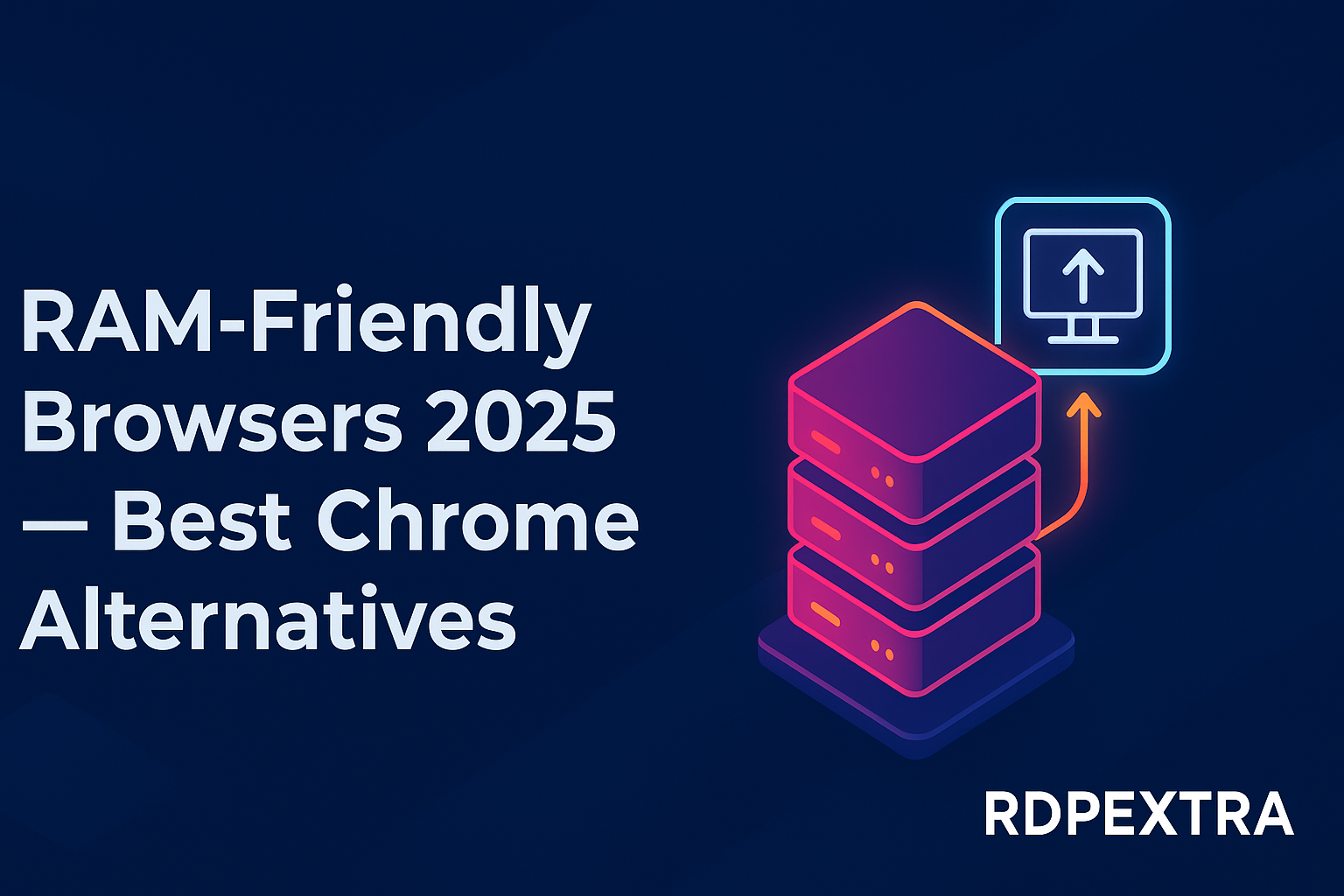
RAM-Friendly Browsers 2025 — Best Chrome Alternatives
Stop Letting Chrome Eat Your RAM: 7 Lightweight Browsers that Run Better in 2025 RAM-Friendly Browsers 2025 — Best Chrome Alternatives.
Browsers are the apps we use most — browsers whic use less ram than chrome and in 2025, many of them still act like they never learned to save energy. If your laptop heats up, tabs stutter, or Chrome sits at 3–4 GB with just a handful of pages open, this guide is for you. Read on and get a faster browser without sacrificing features.
Who this guide is for (audience/personas)
Before we dive in, let’s be specific about who should read this:
- Low-spec laptop users — students or remote workers with 4–8 GB RAM who need smoother browsing.
- Battery-conscious laptop users — people who want longer unplugged time.
- Power users & tab hoarders — folks who keep 30+ tabs open and need sane tab management.
- Privacy-minded users who want speed — people who prefer built-in blockers that reduce background tasks.
- IT admins/support techs — who want short recommendations they can roll out at scale.
Understanding your audience helps pick the right tone and the exact browser recommendation — a student with a cheap Chromebook needs a different solution than a developer with 32 GB of RAM.
Quick answer: Which browser is best on RAM usage?
Short verdict: For most users in 2025, Brave and Microsoft Edge are the top practical picks — Brave for privacy-first, ad-blocking efficiency; Edge for system-level resource controls (sleeping tabs, efficiency mode) and strong engineering improvements this year. Firefox is a great third option if you want an open-source, browsers whic use less ram than chrome lighter memory profile with fewer Chromium processes.
(If you want a single recommendation: try Brave first — enable its shields and measure memory usage before/after. If you rely on a deep Chrome extension ecosystem and Windows integrations, Edge is a pragmatic alternative.)
Top RAM-friendly browsers in 2025 (what makes each one work)
Below I list the browsers I see repeatedly recommended in 2024–25 benchmarks and user communities, and why they behave better than stock Chrome.
Brave — lean by default
Why it’s friendly: Brave blocks ads and trackers at the engine level, which eliminates many ad-related processes and background scripts that chew memory. That often means lower per-site memory overhead out of the box. If you dislike installing multiple ad-blocking extensions, Brave’s default shields are a big memory win.
Best for: People who want a Chromium-like experience, support for Chrome extensions, and a “set it and forget it” privacy+performance combo.
Microsoft Edge — power features to reduce memory use
Why it’s friendly: Edge has built-in Sleeping Tabs, an Efficiency Mode, and features like Startup Boost that control background cost and startup times. Sleeping Tabs automatically frees resources by pausing inactive tabs (you can adjust the timeout), which is one of the most effective built-in RAM savers. Microsoft has also pushed measurable speed and efficiency updates throughout 2024–25.
Best for: Windows users who want deep OS integration and built-in controls without many third-party extensions.
Firefox — the non-Chromium alternative with a lighter profile
Why it’s friendly: Firefox uses a different multi-process model and often shows lower memory use in lightweight browsing scenarios. Mozilla continues to optimize memory usage and keeps privacy features strong, which can reduce background overhead. If you want to avoid Chromium’s process model but still have a fast browser, Firefox is a top pick.
Best for: Users who want open-source, privacy-forward browsing and are okay trading a tiny bit of extension compatibility for lower overhead.
Vivaldi — customize to trim bloat
Why it’s friendly: Vivaldi gives you controls — disable UI features you don’t need, reduce background processes, and use tab stacking/pause strategies that limit active tab load. With the right configuration, it can be more memory-efficient than Chrome for heavy tab users. (Community tests in 2024–25 often call out Vivaldi for decent RAM handling when customized).
Best for: Power users who like deep customization and are willing to tune the browser.
Opera / Opera GX — built-in resource controls
Why it’s friendly: Opera GX markets resource sliders (limit RAM/CPU for the browser), tab suspending, and integrated ad blocking. The GX suite adds gaming-focused overlays, but the resource controls can be useful for throttling background browser usage on weaker machines.
Best for: Gamers or users who like a UI with built-in throttles and don’t mind extra features.
Lightweight Chromium forks & niche picks
If your machine is very old, consider ultra-light browsers or minimal Chromium forks that strip features (but beware compatibility and security support). These are for very specific cases; mainstream options above are safer for general users.
Practical, immediate ways to cut browser RAM (do these now)
These are high-ROI actions. Do them today and you’ll feel the difference.
- Install a lightweight browser extension to suspend tabs — extensions like Tab Suspender unload inactive tabs to free memory (some claim huge memory savings). Use one that is actively maintained.
- Use the browser’s built-in sleeping/efficiency features — Edge’s Sleeping Tabs, Chrome’s Memory Saver, Brave’s shields, and Opera’s tab snooze all help.
- Audit your extensions — each extension adds background processes. Keep only what you use.
- Close or group tabs — use OneTab, tab groups, or workspaces. Fewer active tabs = less RAM.
- Avoid heavy homepages with auto-play ads — these load scripts continuously; set a lightweight new tab or blank page.
- Restart the browser periodically — memory fragmentation can occur after long sessions.
Microsoft Edge performance features vs Chrome — who wins on RAM?
Short answer: Edge often wins on aggressive system-level optimizations; Chrome has broader extension support and some newer Memory Saver options, but historically Chrome prioritizes speed and compatibility sometimes at the cost of memory. browsers whic use less ram than chrome Here’s a compact side-by-side:
- Sleeping tabs: Edge has a robust built-in implementation you can tune; it is designed to free memory on background tabs. This is a clear Edge advantage for users who keep many tabs.
- Startup/background behavior: Edge’s Startup Boost and Microsoft optimizations have reduced load times substantially in 2024–25. WindowsCentral reported measurable load-time improvements for Edge in recent updates.
- Extensions: Chrome still has the largest extension ecosystem; Edge supports Chrome extensions too (it’s Chromium-based), so you can often get the best of both worlds.
- Memory/energy modes: Chrome introduced Memory Saver / Energy Saver features; Edge’s microsoft edge performance features vs chrome Efficiency Mode and Maximum Savings options are competitive and sometimes more aggressive on Windows. (If you want battery life, test both under your workload.)
Recommendation: If you use Windows and want easier, system-integrated memory savings, try Edge with Sleeping Tabs on and measure. If you prioritize privacy + lower baseline RAM, try Brave.
How I evaluated these browsers (transparent criteria — quick CoT-style list)
I focused on practical metrics readers can observe themselves, not just synthetic lab numbers:
- Baseline memory footprint with 5 typical tabs open (news, Gmail, YouTube, Docs, and a forum).
- Background tab behavior — does the browser unload/hibernate inactive tabs?
- Impact of built-in ad/tracker blocking — pages with many ads cause more processes; built-in blockers shrink that.
- Extension/process model — Chromium’s per-tab/per-extension processes vs Firefox’s multiprocess approach.
- Real-world signals — community benchmarks and reputable reviews from 2024–25. (I cross-checked user reports and vendor docs.)
Wrap-up (short, actionable)
You don’t have to accept slowness. In 2025, a smarter browser choice + one lightweight browser extension for tab suspension + a short extension audit will usually cut memory use dramatically. microsoft edge performance features vs chrome Try Brave first (for low-effort wins) or Edge if you want deep Windows integration. Run a 10-minute before/after test and you’ll see the difference.
Call to action: Want a quick checklist to run your own browser RAM test? [Download our 1-page Browser RAM Checklist] — step-by-step tests, what to measure, and the exact settings to toggle for Edge, Chrome, Brave, and Firefox.
FAQs (SEO-friendly answers)
Browsers like Brave, Edge (with Sleeping Tabs), and Firefox often show lower memory use in everyday scenarios, especially when you enable their memory-saving features or use fewer extensions. Run a quick test: open your typical set of tabs in each browser and check Task Manager to compare.
Answer: For many users, Brave (privacy + ad blocking) or Edge (system-level sleeping/efficiency modes) will be the best blend of low RAM and functionality. If you want to avoid Chromium, Firefox is a solid alternative.
For tab management, consider using Tab Suspender or a similar tab-suspending extension (they unload inactive tabs to free up RAM). Also consider OneTab (converts open tabs to a list) if you want to store and restore. Select a well-maintained extension and read reviews before installation.

Leave a Reply